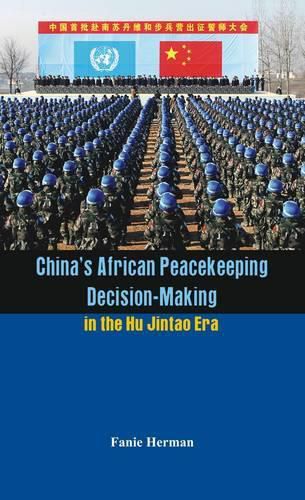Readings Newsletter
Become a Readings Member to make your shopping experience even easier.
Sign in or sign up for free!
You’re not far away from qualifying for FREE standard shipping within Australia
You’ve qualified for FREE standard shipping within Australia
The cart is loading…






This title is printed to order. This book may have been self-published. If so, we cannot guarantee the quality of the content. In the main most books will have gone through the editing process however some may not. We therefore suggest that you be aware of this before ordering this book. If in doubt check either the author or publisher’s details as we are unable to accept any returns unless they are faulty. Please contact us if you have any questions.
China’s role in international peacekeeping has greatly expanded during the leadership of Hu Jintao, and China has since become a significant contributor to peacekeeping operations (PKOs) in Africa. The importance of the book is expressed in the view that peacekeeping intervention is a tool that strengthens or fulfills policy goals in the United Nations Mission in Liberia (UNMIL), the UN Stabilization Mission in the Democratic Republic of the Congo (MONUSCO), and the UN Mission in Darfur (UNAMID). China has considerable interests at stake in Africa, in terms of promoting economic cooperation or gaining access to natural resources. In order to maintain these efforts, it is imperative that a secure and stable environment is created, not only to maintain diplomatic relations with its African partners, but also to express the harmonious worldview and peaceful development concepts, which rose to prominence under the presidency of Hu Jintao. The purpose of this book is therefore to examine the extent to which peacekeeping intervention contributes to China’s relations with these countries. Two models are employed to shed light on this thesis. The rational actor model (RAM) developed by Graham Allison is used in the first instance to explain the goals for each country, the options considered to reach the goals, the consequences or outcomes of choice that will ensure whether a particular option is chosen, and then selecting the option that has the consequences that rank the highest in the leadership’s payoff function. However, the leadership in policy formulation does not always act in a unitary fashion and often needs the input of governmental actors to produce results in decision making. Therefore, the bureaucratic politics model (BPM) of Allison is used in the second instance to indicate the bargaining, influencing and compromising positions of the bureaucracy that has reinforced the rational decisions of the leadership. The main findings are that peacekeeping interventions serve as a mechanism to facilitate cooperation, is significant to China’s goals in the mission countries, and influence and shape bargaining that occur between bureaucratic actors regarding peacekeeping.
$9.00 standard shipping within Australia
FREE standard shipping within Australia for orders over $100.00
Express & International shipping calculated at checkout
This title is printed to order. This book may have been self-published. If so, we cannot guarantee the quality of the content. In the main most books will have gone through the editing process however some may not. We therefore suggest that you be aware of this before ordering this book. If in doubt check either the author or publisher’s details as we are unable to accept any returns unless they are faulty. Please contact us if you have any questions.
China’s role in international peacekeeping has greatly expanded during the leadership of Hu Jintao, and China has since become a significant contributor to peacekeeping operations (PKOs) in Africa. The importance of the book is expressed in the view that peacekeeping intervention is a tool that strengthens or fulfills policy goals in the United Nations Mission in Liberia (UNMIL), the UN Stabilization Mission in the Democratic Republic of the Congo (MONUSCO), and the UN Mission in Darfur (UNAMID). China has considerable interests at stake in Africa, in terms of promoting economic cooperation or gaining access to natural resources. In order to maintain these efforts, it is imperative that a secure and stable environment is created, not only to maintain diplomatic relations with its African partners, but also to express the harmonious worldview and peaceful development concepts, which rose to prominence under the presidency of Hu Jintao. The purpose of this book is therefore to examine the extent to which peacekeeping intervention contributes to China’s relations with these countries. Two models are employed to shed light on this thesis. The rational actor model (RAM) developed by Graham Allison is used in the first instance to explain the goals for each country, the options considered to reach the goals, the consequences or outcomes of choice that will ensure whether a particular option is chosen, and then selecting the option that has the consequences that rank the highest in the leadership’s payoff function. However, the leadership in policy formulation does not always act in a unitary fashion and often needs the input of governmental actors to produce results in decision making. Therefore, the bureaucratic politics model (BPM) of Allison is used in the second instance to indicate the bargaining, influencing and compromising positions of the bureaucracy that has reinforced the rational decisions of the leadership. The main findings are that peacekeeping interventions serve as a mechanism to facilitate cooperation, is significant to China’s goals in the mission countries, and influence and shape bargaining that occur between bureaucratic actors regarding peacekeeping.